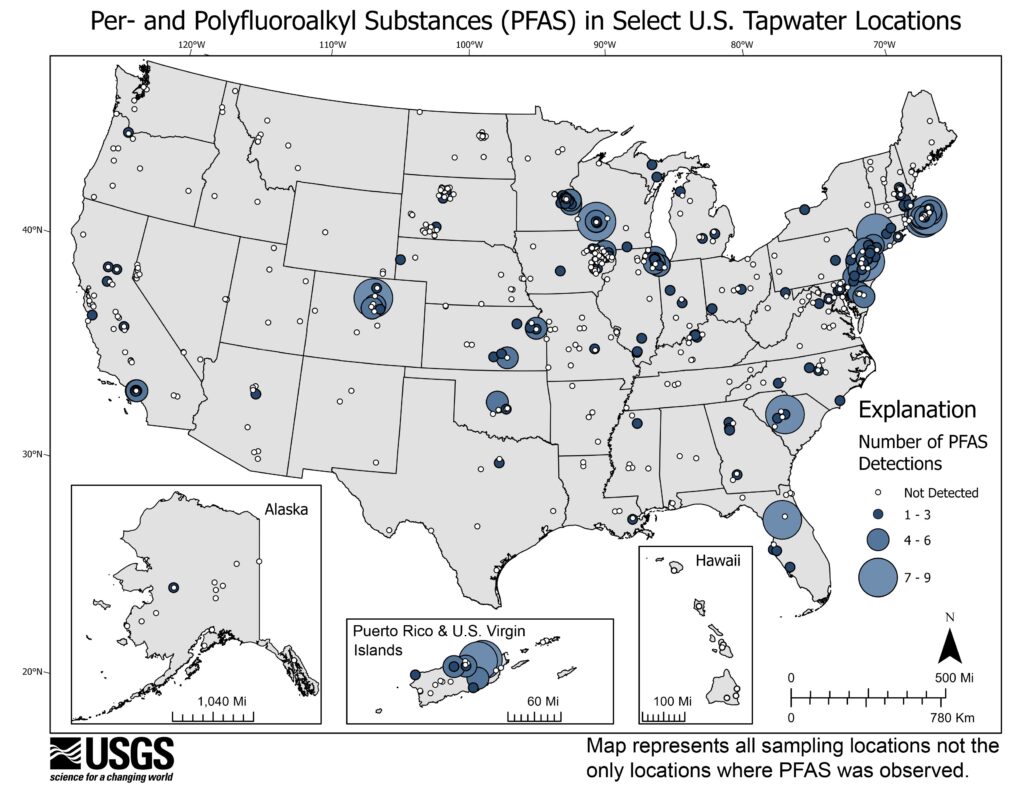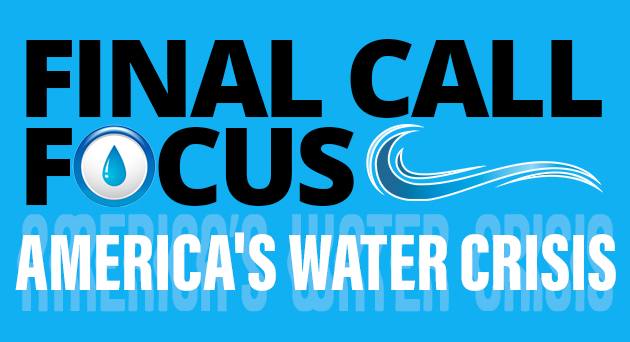An official study released by the United States Geological Survey (USGS), a buretau within the U.S. Department of the Interior, said that about half of the country’s tap water is contaminated with “Forever Chemicals,” commonly referred to as PFAS (per – and polyfluorinated alkyl substances).
These are a class of at least 12,000 man-made chemicals currently found in 33 states and detected in the blood of most Americans. The study was released on July 5.
“For far too long, communities across the United States have been suffering from exposure to PFAS pollution,” said EPA (Environmental Protection Agency) Administrator Michael S. Regan, regarding his agency’s “PFAS Strategic Roadmap: EPA’s Commitment to Action 2021 – 2024” published in October 2021.

“As the science has continued to develop, we know more now than ever about how PFAS build up in our bodies over long periods of time, and how they can cause adverse health effects that can devastate families,” he continued.
“This roadmap will not solve our PFAS challenges overnight,” Administrator Regan said, “But it will turn the tide by harnessing the collective resources and authority across federal, Tribal, state, and local governments to empower meaningful action now.”
According to a fact sheet by the Agency for Toxic Substances and Disease Registry (ATSDR), with the National Center for Environmental Health, blood test results can tell you the amount of PFAS in your blood, but they won’t necessarily tell you how these “Forever Chemicals” will affect your health, although, additional studies have linked these toxins to increased risks of certain cancers, high blood pressure or pre-eclampsia in pregnant women, a decrease in infant birthweights, higher cholesterol levels, and changes in liver enzymes.
“If you have been exposed to perfluoroalkyl and polyfluoroalkyl substances (PFAS) and are concerned about your health, you can talk to your doctor,” an online fact sheet from the CDC (Centers for Disease Control) said of the environmental contaminant. This contaminant is also found in non-stick cookware, water-repellent clothing, stain-resistant fabrics and carpets, some cosmetics, products that resist grease, water, and oil, and food packaging like pizza boxes and microwave popcorn bags.
Clean Water Action is a Washington D.C.-based advocacy and environmental justice organization, founded during the campaign to pass the 1972 Clean Water Act. The organization responded to The Final Call by e-mail that the true extent of PFAS use in consumer products is currently unknown, but other applications of the toxin include its use in dental floss, medications, and medical devices, paint and building materials, car and floor waxes, and other cleaning products.

“PFAS pollution has been documented at 94 sites in 22 states (including industrial plants, military bases, airports and fire training sites) and in the tap water of up to 16 million people in 33 states,” their e-mail said.
Regarding locations most vulnerable to PFAS in drinking water, the peer-reviewed science journal, Environment International (EI), Vol. 178, for August 2023, reported that samples reflected higher concentrations of the toxins from both public water supplies and in private wells, primarily within the Northeast corridor of the United States.
They were also reported in significant levels around Midwest industrial cities, in Northern Virginia, and in the South, from Northern Mississippi, throughout both North and South Carolina, to Central and Western Florida, and in and around New Orleans in Southeast Louisiana.
Other locations showing PFAS contamination included the West Coast, near military bases, larger cities and agricultural areas in California and Washington state, and on the island of Puerto Rico. States such as Utah, Nevada, Wyoming, Idaho, North Dakota, and Montana reported the lowest levels of these synthetic chemicals, according to the USGS map.
“This nationwide pilot assessment included 716 tap water samples collected from residences, businesses, and drinking-water treatment plants across the U.S. from 2016 to 2021,” Environmental International said in the article, “Per- and polyfluoroalkyl substances (PFAS) in United States tapwater: Comparison of underserved private-well and public-supply exposures and associated health implications.”
“Of these, 409 tap water samples were collected at the point-of-use in 2021 from 155 unregulated private–well and 252 regulated public–supply locations in all 50 states, the District of Columbia, Puerto Rico, and the U.S. Virgin Islands using a network of volunteers.”
The map does not represent the only locations in the U.S. with PFAS,” the USGS noted in their report. A recent article in “Environmental Science and Technology,” by Harvard scholars Jahred M. Liddie, Laurel A. Schaider, and Elsie M. Sunderland, said those most affected by contaminated water are Black and Brown people.

“Drinking water contaminated by per- and poly-fluoroalkyl substances (PFAS) is a widespread public health concern, and exposure-response relationships are known to vary across sociodemographic groups,” they said of the harms impacting those relegated to the margins of American society.
“Impoverished communities and communities of color are often disproportionately exposed to environmental pollution and more vulnerable to adverse health outcomes compared to other populations,” noted the Environment International article, “Sociodemographic Factors Are Associated with the Abundance of PFAS Sources and Detection in U.S. Community Water Systems,” published May 15.
The article said,“These disparities reflect discrimination and segregation, which have shaped the spatial patterning of industrial sources of pollution around the U.S., as well as the technical, financial, and managerial capacity of communities to alleviate pollution.”
The Eternal Leader of the Nation of Islam, the Most Honorable Elijah Muhammad, wrote in his landmark book, “How to Eat to Live,” that it is the culture of corporate greed and anti-Black racism that has contributed to the shortening of the lives of Black people in the United States.
“They desire to shorten the span of life for the aboriginal people, who have no beginning or ending—and have done just that—because we have not lived the way of their life,” Messenger Muhammad wrote on page 80 in Book One which was first published in 1967. “What we were and what we are given to eat and drink has shortened our life.
Living under the guidance of the enemy of right and the God of the unrighteous is a very dangerous position to be in,” Mr. Muhammad continued on page 107 of “How to Eat to Live,” Book One. “This has caused many scientists to overlook the dangerous effects that such fast production has on the health of the people. Therefore, the only way out for us, the poor Lost-Found, is to seek refuge and guidance in Allah for our protection from the evil plannings and doings of Satan,” the Messenger wrote on page 108.
Student Minister Dr. Wesley Muhammad, a researcher, author and member of the Nation of Islam Shura Executive Council by the Honorable Minister Louis Farrakhan, told The Final Call that PFAS is only one of the latest chemicals found in America’s water supply, particularly in underserved communities of color.
“Most of these contaminants are endocrine disruptors, which means they mess with the hormone balance of those of us who come in contact with it,” Student Minister Dr. Muhammad explained. He is also a member of the Nation of Islam Research Group.
“Endocrine disruptors are chemical compounds that interfere with the body’s endocrine system and the reproductive and other biological processes it regulates. Little people (pre-adolescent children), run the risk of suffering gender dysphoria, or gender confusion, and even gender malformation of fetuses and in year-old babies,” he said.
“We think we are escaping the problem by turning to bottled water, but so many of the brands of bottled water are just as toxic because the plastic bottles have phthalates, have BPA in them, the same chemicals we’re trying to get away from by avoiding tap water, we run right into them in the bottled water because these plastic bottles have, in particular, phthalates, a gender neutering, gender inversing, (and) gender disrupting chemicals, as is BPA (bisphenol A),” Student Minister Dr. Muhammad stated. Both phthalates and bisphenol A are used in the production of plastics, including those used for food and water containers.
“They are saying that the long-term effects of (PFAS chemicals) aren’t yet known, but the long-term effects of PFAS collect in the environment; we know those short-term and long-term effects, and they are impacting Black women, Black children, and Black men more than they are affecting any other demographic in this country,” Student Minister Dr. Muhammad insisted.
“I can offer no insights on technological mitigation other than to research that for (yourself), but I offer insights on physiological mitigation, and it absolutely is scientifically sound—the dietary prescriptions of the Most Honorable Elijah Muhammad.”
For more information, on the Teachings of the Honorable Elijah Muhammad, refer to “How To Eat To Live,” Books One and Two. Visit store.finalcall.com.













